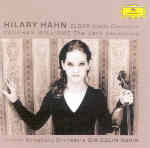Elgar’s Violin Concerto has a certain mystique about it independent of the knee-jerk obeisance it has received in the British press. It probably is the longest and most difficult of all Romantic violin concertos, requiring not just great technical facility but great concentration from the soloist and a real partnership of equals with the orchestra. And like all of Elgar’s large orchestral works, it is extremely episodic in construction and liable to fall apart if not handled with a compelling sense of the long line. In reviewing the score while listening to this excellent performance, I was struck by just how fussy Elgar’s indications often are: the constant accelerandos and ritards, and the minute (and impractical) dynamic indications that ask more questions than they sometimes answer. No version, least of all the composer’s own, even attempts to realize them all: it would be impossible without italicizing and sectionalizing the work to death.
So a great performance of this piece relies more on the general principles that Elgar establishes–flexibility of pulse, dynamic sensitivity–than on a fanatically strict adherence to the letter of the score. At least this is what everyone, beginning with the composer himself, has done. Given the parameters, it’s rather amazing how much detail Hilary Hahn captures without ever losing site of that crucial long, singing line. I’m thinking, for example, of her playing in the first movement after figure 13, which is indeed dolce, legato, and espressivo, with the little tenutos at the top of each note-group perfectly judged. Her entrance in the slow movement, mezzo forte against the general pianissimo in the strings, also is well nigh ideal, and the way she and Davis balance the climax after figure 57 is impressively intense and moving as well. In general, her tempos are flowing and just on the swifter side of average (the work lasts slightly less than 50 minutes in this performance), which is all to the good.
The finale comes off best of all. Hahn manages the rapid passages with remarkable accuracy and purity of tone. When Elgar says “cantabile e vibrato” after figure 73, that’s just what she provides, without the vibrato ever turning maudlin. Her command of the instrument is absolute. She and Davis are at their very best in the cadenza. Every gentle shift of color in those pizzicato tremolos registers with tactile presence (even the double basses), and above this gauzy but ever-changing accompaniment, Hahn captures as much of the music’s elusive and introverted character as anyone ever has. The improvisatory freedom she brings to the runs after figure 102, her reaction to the Più mosso a few bars later, the perfectly tuned double-stops at the Moderato section before figure 104, and countless other details (not least the sadness that Elgar demands) are all eloquently present, while the closing pages display real joy.
I was a little less pleased with The Lark Ascending. It’s not a comatose performance like the one by Kennedy/Rattle, but it’s still a bit slower than I prefer, however beautifully played (gorgeously is more like it). But I can’t imagine anyone having more serious objections. It may be that in the first movement of the concerto, Davis is occasionally too generous in observing Elgar’s invitations to slow down, but he and his soloist are certainly on the same page, and he has the LSO in marvelous form in music that it surely knows extremely well. The recording provides very natural balances: there’s a real sense of space around Hahn’s instrument, and when she plays loudly her tone fills the room without ever turning harsh or shrill. At the same time, no important detail in the orchestral part gets shortchanged, covered by the soloist, or lost in too-distant perspectives.
So where does that leave us in the Elgar Violin Concerto Sweepstakes? I respect Elgar/Menuhin but don’t really love it. Many others do, though. Sammons (now on Naxos) offers the swiftest and most purely thrilling account of the solo part on disc and he has his fans, including me, but he skates over so much detail, and the primitive recording blurs too much of the orchestral part, with a particularly unatmospheric and foggy cadenza in the finale. Knowing what might have been there and listening to what’s preserved on the actual disc is a depressing experience. Kennedy/Handley is much better than his droopy remake with Rattle, but it also hangs fire in places. Curiously, the performance that perhaps comes closest to the “golden age”, though with incomparably better playing and sound, is the Perlman/Barenboim on DG. It times out exactly between Menuhin and Sammons, and in a sense it gives us the best of both.
Hahn’s interpretation is more reticent than Perlman’s, closer to the young Menuhin though again better played by both soloist and orchestra. Beyond that, I prefer DG’s extremely natural sound for Hahn over the typically up-close focus on Perlman (though it suits his approach well enough). Although I will continue to treasure those “golden oldies”, frankly there is little in them that has not been equaled by excellent modern versions. In the final analysis, this is one of those pieces that even more than most classics begs to be heard in differing interpretations, as no single one will ever reveal all that it has to offer. Certainly Hahn deserves a place on any shortlist of essential performances. She’s operating at a level at which personal preference, however strong, cannot diminish the abundant evidence of her superior musicianship and insight. [10/12/2004]
































